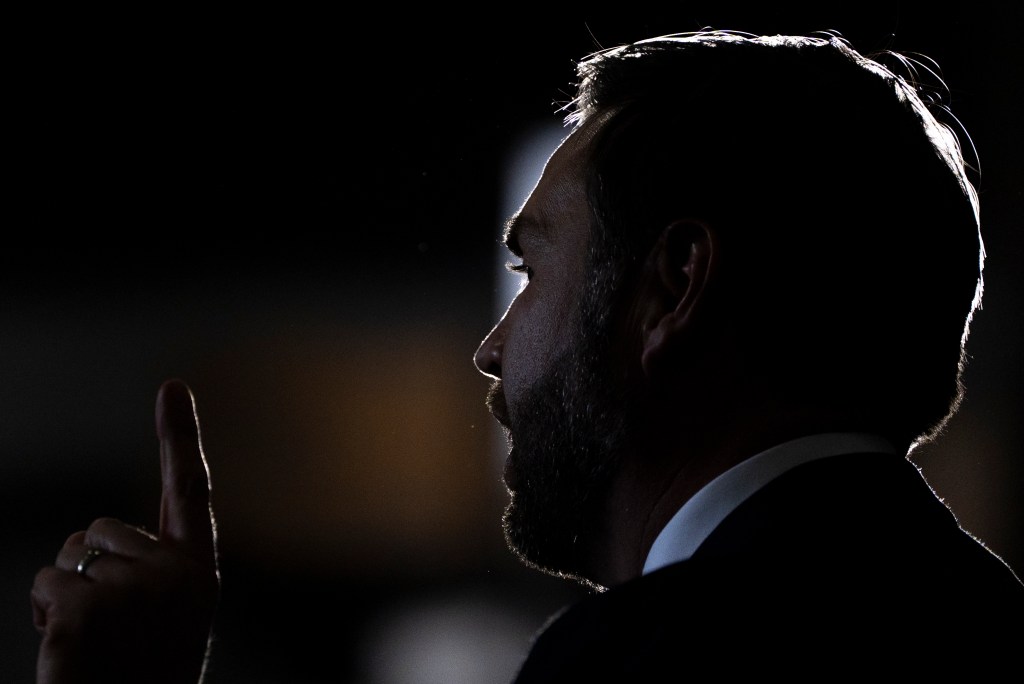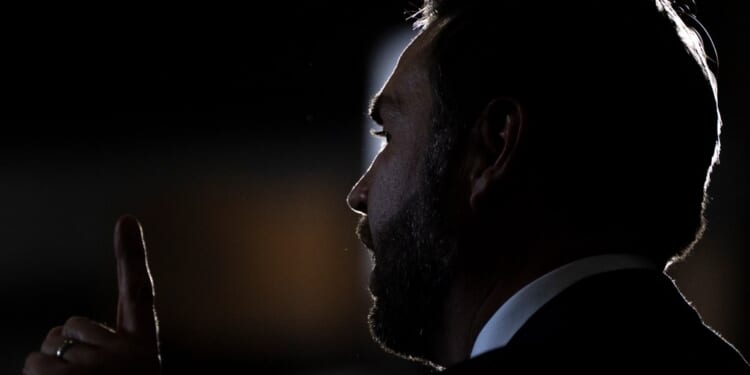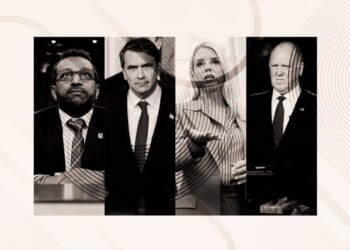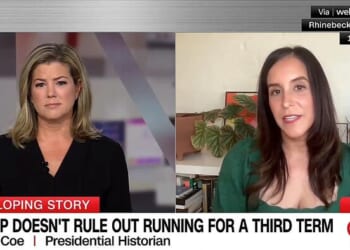
Then again, he did say that he had an epiphany of sorts when he talked to a CEO of a hotel chain in 2018. The fact that the CEO (allegedly) wanted to hire immigrants at a lower wage and thought Vance would sympathize caused Vance to abandon his views on politics and economics. “The fact that this guy saw me as sympathetic to his problem, and not the problem of the workers, made me realize that I’m on a train that has its own momentum, and I have to get off this train or I’m going to wake up in 10 years and really hate everything that I’ve become,” Vance said.
That has more of a ring of truth to it than his explanations of why he became a Trump evangelist. But I still find it lame. If you have anything like an informed economic philosophy or worldview—whatever it may be—discovering that a hotel chain CEO wants to keep labor costs down shouldn’t do much violence to it. I mean, this is not a shocking revelation.
What’s more shocking is that anyone would buy his conversion narrative vis-à-vis Trump. Maybe it’s because I grew up on the right, with a father for whom complaining about the New York Times was a cherished pastime, but the idea that a self-described conservative uncritically accepted what the “mainstream media” told him seems like a pretty damning confession: “Hey, everybody, I was too naïve and media-illiterate to get an internship at The American Spectator!”
But that’s the thing, I don’t actually know anybody who believes Vance’s conversion tale. Attacking the media isn’t an answer to the question, “Why did you change your mind about Trump?” It’s a response, a talking point, and nothing more.
The people who like Vance don’t really care that it’s a dodge. Heck, they like that it’s a dodge, in the same way that fans of Zohran Mamdani like his polished but vacuous responses to questions.
To some extent, this has always been how politics works, particularly for partisans. If your guy successfully evades a problem or pitfall, that’s good enough, because you want your guy to win. But these days, it’s the essence of politics. Saying what you need to say for political advantage is all you need to say. If the answer is honest or persuasive, that’s better—maybe—but honesty and persuasiveness are not anything like a requirement.
When Vance repeatedly spread lies about Haitian immigrants eating dogs and cats (even after his own aides were told they were baseless), he defended the dishonesty in classically leftist terms. “If I have to create stories so that the American media actually pays attention to the suffering of the American people, then that’s what I’m going to do.” That’s the same logic Al Sharpton used to justify his lies about Tawana Brawley being raped: “The story do sound like bulls–t, but it don’t matter. We’re building a movement.”
This is one of the key differences between Trump and Vance. As Eli Lake has brilliantly explicated, Trump is a consummate bullsh-tter. Lake quotes the late philosopher Harry G. Frankfurt’s fascinating essay, On Bullshit:
The liar is limited by his commitment to saying something that conflicts with the truth. So there’s a constraint upon him that he has to respect. Whereas the bulls–tter, who doesn’t care about truth, you know, can go anywhere he likes. And there’s a kind of a panoramic view that he can take that the liar can’t take, because the liar is limited to inserting in a specific place in the system of beliefs a false belief or a true one. Whereas the bulls–tter can go anywhere he likes and draw any kind of picture or any kind of panorama of beliefs that serves his purpose.
Vance isn’t a bulls–tter. He’s just a liar. He’s good at it, or at the very least he’s very comfortable with it, which is often half the battle. I don’t think he’s nearly as good at it as Bill Clinton was. But that’s like saying a good professional baseball player isn’t as good as Babe Ruth or Shohei Ohtani.
Vance’s specialty is in dissembling, distorting, and distracting. He frontloads falsehoods, omits inconvenient facts, and changes the subject to useful irrelevancies and enemies of his base.
For instance, last week Politico reported that the leadership of the Young Republicans routinely texted all sorts of vile things about Jews, blacks, slavery, the Holocaust, rape, etc. Vance leapt to their defense. “Grow up! I’m sorry, focus on the real issues. Don’t focus on what kids say in group chats. … The reality is that kids do stupid things, especially young boys—they tell edgy, offensive jokes. Like, that’s what kids do.” On Twitter, he called it a “college group chat.”
I’ll confess, I bought Vance’s dishonesty to a certain extent. Last week on The Remnant when the story was fresh, I repeated the claim that the participants were “kids.” I still condemned it. But the truth is the participants weren’t kids. They ranged from their mid-20s to 35 years old. So they were about the same age Vance was when he wrote Hillbilly Elegy, and in many cases older than Graham Platner was when the Maine senatorial candidate got an S.S. tattoo. Jay Jones, the Democratic candidate for Virginia attorney general, was in his early 30s when he sent those awful text messages. Paul Ingrassia, the grotesque, bigoted goober who just withdrew from consideration to be the head of ethics in the Justice Department, is 30.
Vance knew this. He just lied. The purpose of the lie was to provide cover for the sorts of young, angry, bigoted denizens of the “manosphere” he and his political patron Tucker Carlson consider to be their core constituency and to refocus attention on the left. That he used Jones’ texts as the justification for aiming all condemnation leftward when one of the offending Republicans, Samuel Douglass, is a young state legislator just like Jones was when he texted horrible things, was irrelevant. When Republicans say evil things, they’re just “kids.” When Democrats do it— “Attack!”
President Vance?
It’s not a surprise to me that Vance’s serious fans don’t care about any of this very much—and he does have a great many serious people who admire him. For a certain kind of intellectual populist or nationalist in the Trump era, Vance is a beacon of hope. They know that Trump is a bulls–tter whose attachment to the kind of politics and policy they want is often incidental. Trump’s economic philosophy cannot successfully be translated into a coherent theoretical framework. It’s too chaotic, mercurial, and glandular for that. But Vance, they believe, is the real deal.
There’s a deep discomfort among many serious-minded people who want a more serious defender of their ideas than Donald Trump. They hear amid the noise of Trump’s presidency a signal of actual policy approaches that could transform America to their liking. It is precisely because Vance is a fairly conventional liar and not a bulls–tter that makes him attractive.
Again, the bulls–tter doesn’t care what the truth is. The liar knows the truth and wants to steer you away from it. Vance has a goal, and he’s willing to defend and apologize for the chaos in order to achieve that goal.
The goal, of course, is to be president of the United States and do Trumpism without the embarrassing bits.
The amount of hopeful chatter and wish-casting about Vance’s prospects of being the next president is remarkable. Now, I don’t think it’s outlandish. He’s the incumbent constitutional understudy to a 79-year-old president. On actuarial terms alone, he’s got a plausible shot.
But I’m profoundly skeptical that if he runs in 2028 not as an incumbent, he’s the shoe-in many see. For starters, do you know how many vice presidents have been elected straight to the presidency since the ratification of the 12th Amendment in 1804? Two. Martin Van Buren and George H.W. Bush. Being vice president definitely increases your odds of becoming president someday, but getting elected straight to the presidency from the vice presidency is exceedingly rare.
Andrew Jackson, Van Buren’s predecessor, was arguably quite popular at the end of his term, and I know many people like to compare Trump to Jackson. But Van Buren benefited from the fact that the Whigs nominated four different candidates to run against him. The Dems may indeed be in disarray in 2028, but I suspect they’ll still nominate just one candidate.
Bush’s predecessor was Ronald Reagan, and he was definitely popular. Even so, Bush was fortunate enough to run against Michael Dukakis.
Regardless, most of the scenarios for Vance to succeed Trump depend not only on Trump being popular in 2028 but on a majority of voters wanting four more years of Trump. That’s possible, but for now seems fairly unlikely. Bush pulled off being mildly critical of Reagan—he promised a “kinder and gentler nation”—without alienating too many Reagan fans. Personally, I don’t think Vance has demonstrated anything like that kind of finesse. He’s not nearly as good on the stump as his boosters think he is. His recent speech to the Marines was decidedly meh, as was his convention speech in 2024.
Vance’s skill as a politician has mostly been at the inside game. He cozied up to tech bros when he ran for Senate, and still needed to be bailed out by Mitch McConnell’s PAC. He got the vice presidential nomination for sucking up to Trump. And he still only won in Ohio by about 6 points. Trump had carried the state two years earlier by 8 points. In the same election year as Vance’s 6-point win, the incumbent governor won by 25 points, the Republican attorney general and secretary of state both won by about 20 points, and the treasurer by 17 points. In other words, lots of Republicans didn’t like him.
But even if I’m being unfair, which is possible given my general opinion of Vance as a politician, does anyone think Trump will have the same maturity and grace that Reagan did? Will his fans tolerate anything like Bush’s “kinder and gentler” talk? Will anyone else buy it coming from the guy who spent four years lying about immigrants and running cover for Nazi cosplayers?
And this assumes he’ll get the GOP nomination. Of course, Vance is the favorite right now. He’s the only person everyone knows will run, and he’s deeply bound up with the Trump fundraising machine. But contrary to a lot of progressive protestation about money and politics, having a lot of money is necessary but not sufficient. Just ask Ron DeSantis, Phil Gramm, and countless others.
One of the weirdest things about MAGA world is its unalloyed confidence that everything they are doing is popular. I think some of it comes from believing Trump’s B.S. But some of it is also a consequence of nationalist and populist rhetoric. They insist they represent “the people” and so therefore everything they do must be popular as a result. But that’s just not true. Trump’s poll numbers aren’t good. Even his handling of immigration is now underwater.
But I think the biggest reason that a lot of people think Trump is more popular than he is stems from the fact that Republicans and conservative media “influencers” are scared of criticizing him. If you don’t hear dissent from the right, and all you consume is right-wing media, you can be forgiven for thinking everyone is psyched about how things are going.
But you know what? None of that will work the same way for Vance. Republicans are scared of Trump, not Vance. Trump unifies the right in ways Vance won’t. Vance’s fans won’t like criticisms of Vance, but they won’t take it personally the way Trump’s fans do. Vance is a politician, not a celebrity. He’s nowhere near a good enough politician to turn himself into a celebrity. And he won’t scare away every other politician who wants the nomination.
Back when Hillary Clinton was first running for president, I was amazed at the degree to which her fans believed that her husband’s skills and appeal were a kind of marital community property. Bill was charismatic, Hillary was the kind of woman who chastises you for being too loud in the library. If your husband is a great piano player, getting a marriage certificate doesn’t magically make you a concert pianist.
The same point applies to Vance. Whatever magic Trump has, Vance doesn’t have it any more than Mike Pence did. Moreover, the Trump coalition isn’t a crown that can be handed off to a successor, because nothing holds the Trump coalition together except for Trump himself (and right now the Trump coalition doesn’t even look like a majority). The Trump coalition is divided over everything from tariffs to Israel to tolerance for crude Nazi joke-telling jabroneys. Trump can spackle over party differences with his bulls–t and threats. Vance cannot hold it all together with mere lies.
Maybe I’m wrong. Maybe Rubio, DeSantis, Cruz, Cotton, and all the rest will put aside their ambitions and get out of Vance’s way. Or maybe I’m right, but the Democrats will nominate a Dukakis and make me look wrong just the same.
But for now, I’m just not buying it.
















